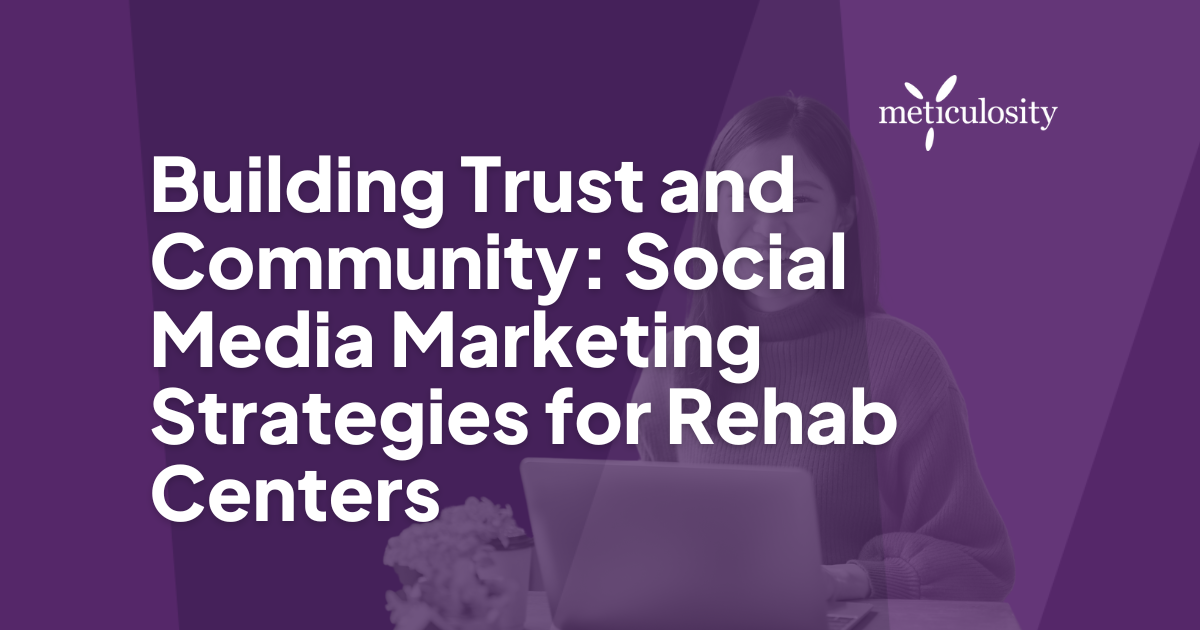Does your rehab center often grapple with reaching potential clients or breaking free from the stigma associated with treatment? We understand it's a tough spot to be in.
In this article, we will explore strategies like making use of video content, offering educational resources online, and leveraging social networks to foster community building. These techniques aim to enhance your brand's impact, build trust among your audience, and reduce stigma by making treatment feel familiar and attainable, rather than foreign or scary.
Key Takeaways
- Social media marketing is crucial for rehab centers as it helps reach potential clients and break stigmas surrounding addiction.
- Utilizing video content can engage audiences by showcasing success stories, offering educational resources, and sharing testimonials from individuals who have sought treatment at the rehab center.
- Providing educational resources through social media allows rehab centers to share information on addiction and recovery, offer helpful tips for seeking treatment, and break down stigmas associated with seeking help.
- Establishing trust through transparency entails sharing genuine, personal stories to encourage openness and honesty, and openly discussing treatment options and processes to help potential clients feel more at ease when seeking assistance.
Why Social Media Marketing is Crucial for Rehab Centers
Social media marketing enables rehab centers to reach potential clients and break stigmas and misconceptions surrounding addiction and recovery.
Reaching potential clients
Social media is a powerful tool to reach potential clients. People spend a lot of time online. They scroll through posts, like photos, and read comments. A rehab center can use this platform to show what they do.
Posts can be about the help they give or what their facility and grounds look like. With each post, more people may learn about the rehab center's work and even decide to reach out to learn more about treatment.
Breaking stigmas and misconceptions
Social media gives us a chance to break society's misleading ideas about rehab centers. Many people think of these places as scary or bad but with the help of social media, treatment centers are able to show them that it is not true. Posting real stories can help do this.
It allows people to see what happens in a rehab center.
Recovery centers also need to fight against the shame tied up with addiction and treatment. People often feel too embarrassed to ask for help because they fear what others may say or think. By sharing the truth, we make it easier for such persons to seek help without feeling judged.
Utilizing Video Content for Effective Social Media Marketing
Engage your audience with captivating and informative videos that showcase success stories and testimonials of individuals who have sought treatment at your rehab center.
Engaging and informative videos
Videos play a big part in marketing. They catch the eye quicker than words. For rehab centers, we can use this tool in many ways. One way is to show what happens inside your center.
This can help people know what to expect if they come to your center for help. Videos can also share facts about addiction and recovery. This helps break wrong ideas that people may have about these subjects.
Success stories are another great video idea; they provide hope to those who need it most. So, grab your cameras and start filming today! Click here to learn more about utilizing video in your marketing efforts.
Sharing success stories and testimonials
Sharing success stories and testimonials on social media is a powerful way for rehab centers to build trust and credibility with their audience. By showcasing the experiences of individuals who have successfully gone through treatment, these stories can inspire hope and show potential clients that recovery is possible.
Testimonials also provide social proof, demonstrating that your center has helped others achieve positive outcomes. When sharing these stories, it's important to highlight the progress made by each individual and emphasize the role your center played in their journey toward recovery.
This can help prospective clients see the value of your services and feel more confident in seeking treatment.
Providing Educational Resources through Social Media
Rehab centers can effectively utilize social media to provide educational resources on addiction and recovery, sharing valuable information and offering helpful tips for those seeking treatment.
Sharing information on addiction and recovery
To effectively reach potential clients and provide valuable resources, rehab centers can utilize social media to share information on addiction and recovery. This can include educational articles, infographics, or videos that offer insights into the nature of addiction, available treatment options, and strategies for successful recovery.
By sharing this information in a clear and accessible manner, rehab centers can not only help individuals struggling with addiction better understand their condition but also encourage them to seek treatment.
Through social media platforms, we have the opportunity to educate and inform a wide audience about addiction and recovery while breaking down stigmas associated with seeking help.
Offering tips and advice for seeking treatment
It's always important to share helpful tips and advice to individuals seeking treatment. This information can make a real difference in their journey toward recovery.
Here are a few key topics you can address with your audience through social media:
- Research different rehab centers: Take the time to research and compare multiple rehab centers before making a decision. Look for facilities that specialize in your specific needs, whether it's drug addiction, alcoholism, gambling, or mental health issues.
- Consider the treatment options available: Different rehab centers offer various treatment approaches, such as residential programs, outpatient services, or holistic therapies. It's essential to find a program that aligns with your preferences and goals for recovery.
- Verify accreditation and licensing: Ensure that the rehab center you choose is accredited and licensed by reputable organizations. This certification ensures that the facility meets certain standards of quality and safety.
- Seek recommendations from trusted sources: Reach out to friends, family members, or healthcare professionals who may have experience with rehab centers. Their firsthand recommendations can provide valuable insights and help guide you in making an informed decision.
- Evaluate the staff credentials and expertise: Research the qualifications and experience of the staff members at potential rehab centers. Look for licensed therapists, doctors specialized in addiction medicine, and other professionals who can provide comprehensive care.
- Inquire about aftercare programs: Recovery doesn't end when you leave the rehab center. Ask about what kind of aftercare programs are available to support you once you complete your treatment program. These may include counseling services, support groups, or additional resources to ensure continued success.
- Understand insurance coverage and financial options: Rehabilitation services can be costly, so it's important to understand your insurance coverage or explore financial assistance options available at different centers.
Building Trust Through Transparency
Building trust through transparency is a key component of social media marketing for rehab centers. Sharing authentic and personal stories promotes openness and honesty while being open about treatment options and processes helps potential clients feel more comfortable seeking help.
Sharing authentic and personal stories
Sharing authentic and personal stories is a powerful way for rehab centers to connect with their audience on social media. By opening up and sharing real experiences, we can break down barriers and build trust.
When people see others who have gone through similar struggles and successfully recovered, it gives them hope and encouragement. It also helps to humanize the rehab center, making it more relatable and approachable.
Through these stories, you can showcase the journey of recovery, highlighting the challenges faced along the way and celebrating the victories. Additionally, by sharing stories of staff members who are passionate about helping others overcome addiction, you demonstrate your commitment to providing quality care.
Remember that authenticity is key when sharing personal stories. It's important to respect privacy while still genuinely conveying emotions and experiences. By doing so, you create a sense of empathy among your audience which fosters connection and understanding.
Being open about treatment options and processes
When it comes to social media marketing for rehab centers, being open about treatment options and processes is crucial. People who are seeking help need clear and transparent information about what their options are and how the process works.
By providing this information on social media platforms, rehab centers can build trust with potential clients. It shows that they value honesty and want to empower individuals to make informed decisions about their recovery journey.
Additionally, being open about treatment options helps break down stigmas surrounding addiction by educating the public on the different approaches to recovery. This fosters a supportive community where people feel comfortable reaching out for help without judgment or shame.

Leveraging Social Media for Community Building
Creating a sense of belonging and support through social media platforms allows rehab centers to encourage open communication among individuals seeking treatment.
Creating a sense of belonging and support
Creating a sense of belonging and support is essential for rehab centers through social media marketing. By engaging with individuals who are seeking recovery, providing a platform for open communication, and fostering a supportive online community, rehab centers can establish trust and encourage those in need to seek help.
Sharing inspirational stories of success, offering words of encouragement, and responding to comments or messages promptly can make individuals feel valued and supported. Through social media, rehab centers can connect people on similar journeys, reminding them that they are not alone in their struggles.
Encouraging open communication
Open communication is crucial for building trust and creating a sense of community on social media. As rehab centers, it's important to encourage people to share their thoughts, experiences, and concerns openly.
By fostering an environment where individuals feel comfortable expressing themselves, you can establish meaningful connections with your audience. This means actively listening to feedback, responding promptly and empathetically, and addressing any questions or inquiries they may have.
When people feel heard and understood, they are more likely to engage with your content and develop a sense of trust in your organization.
To encourage open communication, it's essential to create a safe space where individuals feel supported without judgment. By moderating comments and discussions effectively, you can ensure that conversations remain respectful and constructive.
It's also helpful to proactively initiate dialogue by asking thought-provoking questions or prompting discussions around topics related to addiction recovery. By giving people the opportunity to share their stories and perspectives openly, you show that you value their input and are committed to understanding their needs.
Establishing Authority in the Industry
To establish authority in the industry, share your knowledge and expertise through social media content and collaborate with other professionals and organizations.
Sharing knowledge and expertise
As a rehab center, one effective way to build trust and credibility on social media is by sharing your knowledge and expertise. By providing valuable information about addiction, recovery, and treatment options, you can position yourself as an authority in the industry.
Share educational resources such as articles, infographics, or podcasts that offer helpful tips and advice for those seeking treatment. Collaborating with other professionals and organizations further demonstrates your commitment to staying informed and connected within the field.
By consistently sharing valuable content, you can establish yourself as a trusted source of information in the eyes of potential clients and the community at large.
Collaborating with other professionals and organizations
Collaborating with other professionals and organizations is essential for the success of social media marketing strategies for rehab centers. It helps in:
- Expanding networks and reaching a wider audience
- Sharing knowledge and expertise with peers
- Establishing credibility and authority in the industry
- Building partnerships for joint campaigns and initiatives
- Gaining access to resources and support from like-minded organizations.
Utilizing Social Media Advertising
Social media advertising allows rehab centers to target specific demographics and interests, increasing brand awareness and visibility.
Targeting specific demographics and interests
To effectively reach potential clients and maximize the impact of social media marketing for rehab centers, it is important to target specific demographics and interests. By doing so, you can tailor your content to appeal directly to those who are most likely in need of your services.
For example, you might create ads or posts that specifically speak to the concerns of young adults struggling with addiction or their concerned parents. This targeted approach helps increase the chances of reaching individuals who are actively seeking help or support.
Additionally, by understanding the interests and preferences of your target audience, you can create content that resonates with them on a deeper level and encourages engagement. So remember, when using social media for rehab centers, targeting specific demographics and interests is key!
Increasing brand awareness and visibility
One essential aspect of social media marketing for rehab centers is increasing brand awareness and visibility. By utilizing various social media platforms, you can reach a wider audience and make your brand more recognizable.
This is important because it helps potential clients become aware of your rehab center's existence and the services you offer. Through strategic posting, engaging content, and targeted advertising, you can effectively expand your reach and ensure that your brand remains visible to those who may need addiction treatment or support.

Conclusion
In conclusion, social media marketing is crucial for rehab centers to reach potential clients and break stigmas surrounding addiction. By utilizing video content, providing educational resources, and building trust through transparency, rehab centers can create a sense of community and establish authority in the industry.
Leveraging social media advertising further enhances brand awareness and visibility. Success stories showcase the effectiveness of these strategies, making social media an essential tool for building trust and community in the rehab center industry.
Click here to learn more about addiction treatment marketing.
FAQs
1. What are social media marketing strategies for rehab centers?
Social media marketing strategies for rehab centers help to build trust and community through branding and networking practices.
2. How can networking impact a rehab center’s social media strategy?
Networking is an effective way to spread the word about a rehab center, connect with potential clients, and form partnerships on social media platforms.
3. Can branding influence the success of a rehab center's social media presence?
Yes! Branding shows who you are as a rehab center. It helps create trust with your online community and stand out in people's minds.
4. Why is building trust vital in social media marketing for rehab centers?
Building trust is crucial because it makes people more willing to choose your services. Social media lets you show that you care about helping people get better.









